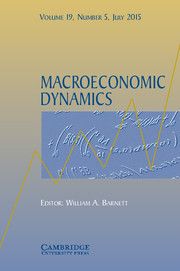
The Effects of Fiscal Policy in an Estimated DSGE Model – The Case of the German Stimulus Packages During the Great Recession
In this paper, we analyze the effects of the stimulus packages adopted by the German government during the Great Recession. We employ a standard medium-scale dynamic stochastic general equilibrium (DSGE) model extended by non-optimizing households and a detailed fiscal sector. In particular, the dynamics of spending and revenue variables are modeled as feedback rules with respect to the cyclical components of output, hours worked and private investment. Based on the estimated rules, fiscal shocks are identified. According to the results, fiscal policy, in particular public consumption, investment, and transfers prevented a sharper and prolonged decline of German output at the beginning of the Great Recession, suggesting a timely response of fiscal policy. The overall effects, however, are small when compared to other domestic and international shocks that contributed to the economic downturn. Our overall findings are not sensitive to considering fiscal foresight.





